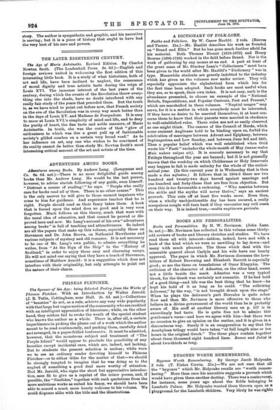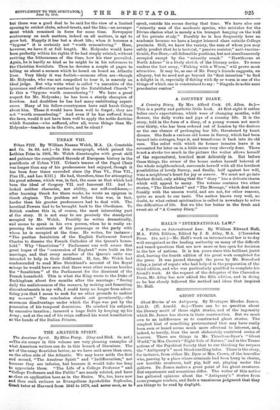BYGONES WORTH REMEMBERING.
Bygones Worth Remembering. By George Jacob Holyoake. 2 vols. (T. Fisher Unwin. 21s.)—We are not sure that all the "bygones" which Mr. Holyoake recalls are "worth remem- bering." More than once his narrative suggests a proverb which would have given them another destiny. There was a controversy, for instance, some years ago about the fields belonging to Lambeth Palace. Mr. Holyoake wanted them thrown open as a playground for the Lambeth children. Very likely he was right but there was a good deal to be said for the view of a limited opening to cricket clubs, school-treats, and the like,—an arrange- ment which remained in force for some time. Newspaper controversy on such matters, indeed on all matters, is apt to grow hot. Happily it has but a short life ; when it becomes a "bygone" it is certainly not `worth remembering." Here, however, we have it at full length. Mr. Holyoake would have been perfectly within his rights if he had simply related, without reviving the bitternesses of the time, how his view prevailed. Again, he is hardly as kind as he might be in his references to the Christian Socialists. Then he devotes a couple of pages to telling us about a sermon which he heard on board an Atlantic liner. Very likely it was foolish—sermons often are—though Mr. Holyoake, who was not compelled to hear it, is scarcely an ideal judge. But why write what is called "a narrative of the ignorance and effrontery nurtured by the Established Church"? Is this a "bygone worth remembering" ? We have a great respect for Mr. Holyoake; he has been a sturdy champion of freedom. And doubtless he has had many embittering experi- ences. Many of his fellow-countrymen have said harsh things about him. These it would have been well to forget; they are not " worth remembering." And even if he has suffered from the laws, would it not have been well to apply the noble doctrine which Socrates—who suffered, after all, worse things than Mr. Holyoake—teaches us in the Crito, and be silent ?



















































 Previous page
Previous page